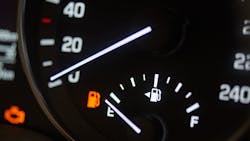The National Highway Traffic Safety Administration issued new Corporate Average Fuel Economy standards for passenger vehicles and light trucks through 2031, easing the proposed requirements announced last year. The final requirements set the average fuel-economy rating for each manufacturer at 50.4 miles per gallon by 2031, up from the current 39.1 mpg rating.
Since 1975, through NHTSA, the U.S. Dept. of Transportation has set target fuel-economy standards for vehicles sold in in the U.S., raising the average at annual increments. The manufacturers face federal fines for exceeding the mandated average.
The new standard slows the current pace of increasing fuel-economy regulations. For example, in 2022 NHTSA set a rule of 49 mpg for 2024-2026 requiring a fleet average of 49 mpg by 2026 – targeting efficiency increases of 8% in 2024 and 2025 and 10% in 2026.
Last year, NHTSA signaled it would set new CAFE standards at 2% annual increases for passenger cars and 4% annual increases for light trucks, from 2027 through 2032.
Now, the final rule requires no increase in CAFE standards for light trucks during 2027-2028, and increases of just 2% annually for 2029-2031.
U.S. Secretary of Transportation Pete Buttigieg claimed the final rules would increase fuel efficiency for passenger cars about 2%, and a similar increase would be seen for light trucks by 2031.
The department further projected the new standards would save vehicle owners $600 per year in fuel costs.
Reportedly, NHTSA was responsive to auto and truck manufacturers’ need to reduce their penalties for exceeding the CAFE standards based on the sales volumes for light trucks. Because automakers cannot apply the fuel efficiency ratings for their hybrid and electric vehicles – they are under some financial pressure to uphold the engineering goals of the CAFE regimen.
“The administration appears to have landed on a CAFE rule that works with the other recent federal tailpipe rules,” stated John Bozzella, president and CEO of Alliance for Automotive Innovation, an automotive industry trade association.
The agency noted that automakers "cannot stop manufacturing large, fuel-inefficient light trucks while also transitioning to manufacturing electric vehicles."
About the Author
Robert Brooks
Content Director
Robert Brooks has been a business-to-business reporter, writer, editor, and columnist for more than 20 years, specializing in the primary metal and basic manufacturing industries.
